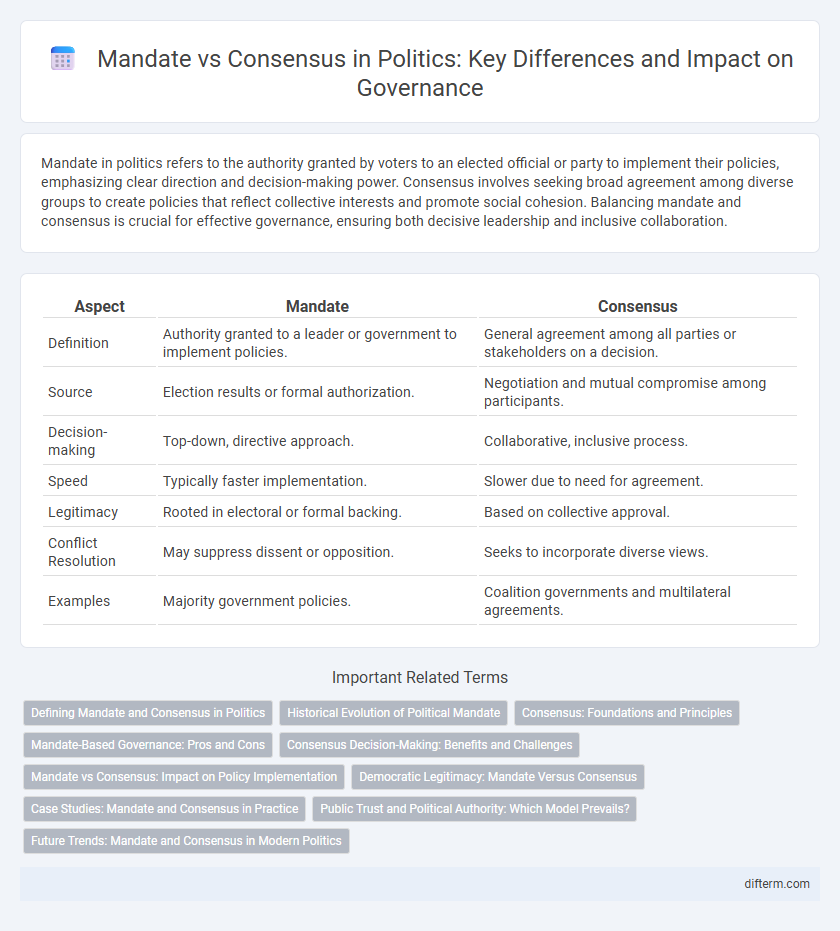Mandate in politics refers to the authority granted by voters to an elected official or party to implement their policies, emphasizing clear direction and decision-making power. Consensus involves seeking broad agreement among diverse groups to create policies that reflect collective interests and promote social cohesion. Balancing mandate and consensus is crucial for effective governance, ensuring both decisive leadership and inclusive collaboration.
Table of Comparison
| Aspect | Mandate | Consensus |
|---|---|---|
| Definition | Authority granted to a leader or government to implement policies. | General agreement among all parties or stakeholders on a decision. |
| Source | Election results or formal authorization. | Negotiation and mutual compromise among participants. |
| Decision-making | Top-down, directive approach. | Collaborative, inclusive process. |
| Speed | Typically faster implementation. | Slower due to need for agreement. |
| Legitimacy | Rooted in electoral or formal backing. | Based on collective approval. |
| Conflict Resolution | May suppress dissent or opposition. | Seeks to incorporate diverse views. |
| Examples | Majority government policies. | Coalition governments and multilateral agreements. |
Defining Mandate and Consensus in Politics
A political mandate refers to the authority granted by voters to an elected official or party to implement specific policies based on their electoral platform. Consensus in politics involves general agreement among diverse stakeholders, achieved through negotiation and compromise, to formulate policies that reflect collective interests. Understanding the distinction between mandate and consensus is crucial for effective governance, as mandates emphasize electoral legitimacy while consensus prioritizes collaborative decision-making.
Historical Evolution of Political Mandate
The historical evolution of political mandate reflects a transition from absolutist rule to democratic representation, where mandates are derived from electoral legitimacy rather than hereditary or authoritarian power. Mandates historically concentrated authority in a single ruler or elite, but modern political systems emphasize consensus-building among diverse stakeholders to legitimize governance. This shift highlights the growing importance of public participation and collective decision-making in shaping political authority.
Consensus: Foundations and Principles
Consensus in politics is rooted in collaborative decision-making, emphasizing shared values and collective agreement to legitimize policy directions. It prioritizes inclusivity and dialogue, facilitating sustainable governance by integrating diverse viewpoints into coherent solutions. This foundation fosters stability and social cohesion, reducing conflict through mutual respect and negotiated compromise.
Mandate-Based Governance: Pros and Cons
Mandate-based governance ensures decisive leadership by legitimizing policy implementation through a clear electoral mandate, enhancing accountability and policy continuity. However, it risks marginalizing minority opinions and may lead to polarized political environments due to its focus on majority rule. Balancing strong mandates with inclusive dialogue is essential for sustainable democratic governance.
Consensus Decision-Making: Benefits and Challenges
Consensus decision-making fosters inclusive participation, ensuring diverse viewpoints shape policies and enhancing democratic legitimacy. It promotes collaboration and reduces conflict by seeking common ground among stakeholders, facilitating sustainable and widely accepted outcomes. Challenges include prolonged discussions and difficulty reaching agreement, especially in polarized political environments where competing interests resist compromise.
Mandate vs Consensus: Impact on Policy Implementation
A strong mandate provides clear political legitimacy and authority, enabling swift policy implementation by reducing opposition and uncertainty. Consensus-building fosters broader support and collaboration, but it often slows decision-making and dilutes policy objectives due to compromise. Effective policy outcomes depend on balancing mandate-driven decisiveness with consensus-based inclusivity to address complex social needs.
Democratic Legitimacy: Mandate Versus Consensus
Democratic legitimacy hinges on the balance between mandate and consensus, where mandates derive authority from electoral victories granting clear policy direction, while consensus emphasizes inclusive agreement across diverse political actors to ensure broader representativeness. Mandate-based legitimacy often accelerates decision-making by reflecting majority will, but risks marginalizing minority voices, whereas consensus-building fosters stability and social cohesion by integrating varied interests. Understanding this dynamic is crucial for evaluating the legitimacy of political systems and their governance effectiveness in pluralistic societies.
Case Studies: Mandate and Consensus in Practice
The 2019 Canadian federal election exemplifies a mandate scenario where the Liberal Party secured a strong majority, enabling decisive policy implementation without broad opposition support. In contrast, Germany's coalition government post-2021 elections illustrates consensus-based governance, where multiple parties negotiate and share power to achieve legislative approval. These cases highlight how mandates facilitate rapid decision-making, whereas consensus fosters inclusive and durable political agreements.
Public Trust and Political Authority: Which Model Prevails?
Public trust in political authority often hinges on the perceived legitimacy of the governing model, with mandate-driven approaches emphasizing electoral victory while consensus models prioritize inclusive decision-making. Mandate-based legitimacy bolsters authority through clear, decisive mandates reflecting the majority's will, enhancing political stability but risking alienation of minority groups. Consensus models foster broader public trust by incorporating diverse perspectives, promoting legitimacy through cooperation and shared governance, which can mitigate polarization and strengthen democratic resilience.
Future Trends: Mandate and Consensus in Modern Politics
Future trends in modern politics emphasize a dynamic interplay between mandate and consensus, where political leaders increasingly rely on clear electoral mandates to assert policy agendas while simultaneously seeking broad consensus to ensure sustainable governance. The rise of polarized electorates challenges the feasibility of consensus, prompting a shift toward strategic mandate-driven decision-making to address urgent societal issues. Emerging democratic innovations, such as deliberative democracy and participatory policymaking, reflect efforts to balance authoritative mandates with inclusive consensus-building in complex political landscapes.
mandate vs consensus Infographic

 difterm.com
difterm.com